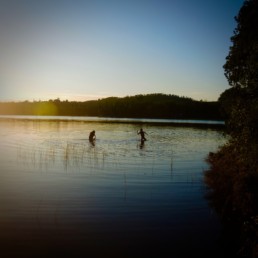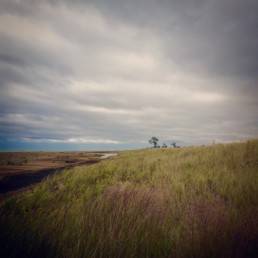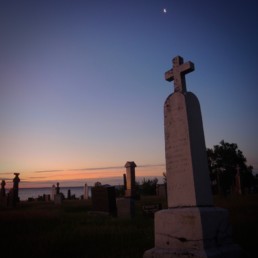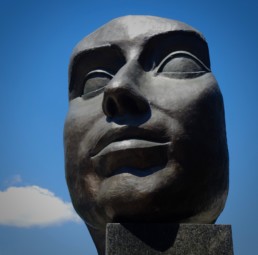A few years ago, on the day after Thanksgiving, I fractured my foot. There was no exotic tale behind my misadventure — no ski jumping, rock climbing or backcountry trekking — rather, a mistimed landing in a trampoline park with my mortified kids looking on. The subsequent journey to the emergency room and through the medical system was equally humbling, particularly as a physician who is accustomed to being on the other side of the sick bed. The first days at home presented yet another challenge — of forced stillness and unsteady hobbling, of finding my balance when I was afraid to fall once again. Lessons in patience and vulnerability generally come at a cost, arriving as gifts wrapped in something else that may be at first unwelcome.
“When we were children, we used to think that when we were grown-up we would no longer be vulnerable. But to grow up is to accept vulnerability... To be alive is to be vulnerable.”
~ Madeleine L'Engle

Each year when Advent arrives, and again in the relative quiet after holiday celebrations, I welcome the prospect of stillness — the opportunity to reflect on the mystery and paradox of power born in humility, of wisdom whispering in darkness. And each year, even as we light the candles and listen to the ancient tales, the season passes me by. In addition to the usual responsibilities of work and parenting, there is the energy and preparation that goes into the traditions and celebrations of the holiday season. There is a joy and a positivity in this, yet also a certain amount of willing away the dark winter stillness that we fear and avoid. We fill our calendars, light up our homes, refuse to sit still, find it hard to balance.
In the weeks of forced stillness after my injury, I still found ways to distract myself. It was as easy as the push of a button, the click of a mouse. I could call in all the voices of the media, the culture, the noisy world outside my quiet room. We fear the unknown, whether that is a fear of silence and darkness, or our own limitations, or people and experiences outside of our protected spaces that we perceive as different in some named or unnamable way.

"Anxiety is the dizziness of freedom."
- Soren Kierkegaard
Perhaps our greatest fear is not really what divides us, but rather the recognition that we are not so different after all. In medical school, one of the first tasks assigned to prospective physicians is the dissection of a human cadaver. We confront our own mortality and humanity, laid bare in the most transparent of ways. We build and strengthen defenses against this most blatant truth in order to learn, and later to work, in a field where human frailty and strength, messiness and heroism, are on full display each day. In hospitals and nursing homes, rehabilitation centers and clinics, at births and deaths, we encounter human beings as their most vulnerable, elemental selves. It is a challenge to do this well: to hold one’s self apart enough to make clear and sound decisions while still holding a hand; to remain a professional, while recognizing that the division between provider and patient is as thin and airy as gauze.
“In the moonlight which is always sad, as the light of the sun itself is--as the light called human life is--at its coming and its going.”
- Charles Dickens

I have had the privilege of walking with patients whose lives, at face value, are quite different from my own. These differences in culture, class, language, and religion are never insignificant, for they are part of who we are, of our own paths and stories. But when they are brought into close quarters, close enough for listening in a small space of stillness, they melt steadily, like springtime ice. We hope, we love, we regret, we deny. The core of who we are as people looks remarkably similar if we are allowed and willing to have that part of us accepted and honored and understood.
Regret sounds much the same in a 35-year-old ex-gang member as it does in a 75-year-old grandfather. Denial of the toll our own choices take on our health has the same effect in the suburbs as it does in the inner city. The joy and wonder at the birth of a child is worn much the same by a teenage high school dropout and a married professional. This should not wash away the ways in which the challenges and circumstances of our lives affect our experience. For some, the circumstances of life, whether overt or hidden, make rising up more difficult and falling all too easy. But everywhere life is full of brave and broken heroes, rising stars and hidden brilliance, and all of us hobbling along and trying to keep our balance. Perhaps we honor our differences best when we acknowledge and reverence our similar, vulnerable core.

“...and that visibility which makes us most vulnerable is that which also is the source of our greatest strength.”
- Audre Lorde
The news is full of the worst evidence of our human divisions. There are so-call leaders and politicians of every creed who are willing to exploit and explode these differences, so that fear becomes our most uniting factor. Perhaps our greatest challenge in this season is to plant the seeds of division in what feels like frozen ground, to believe that there is transforming power in the dark stillness of winter. Rather than listening to the shouts of the power-hungry, we could listen to the voice of the vulnerable, perhaps one who is different, one that we fear. Perhaps we will find the courage to recognize our own vulnerability as we welcome the stranger into our midst, and prepare a place for the stillness that might allow us to listen deeply and love generously.